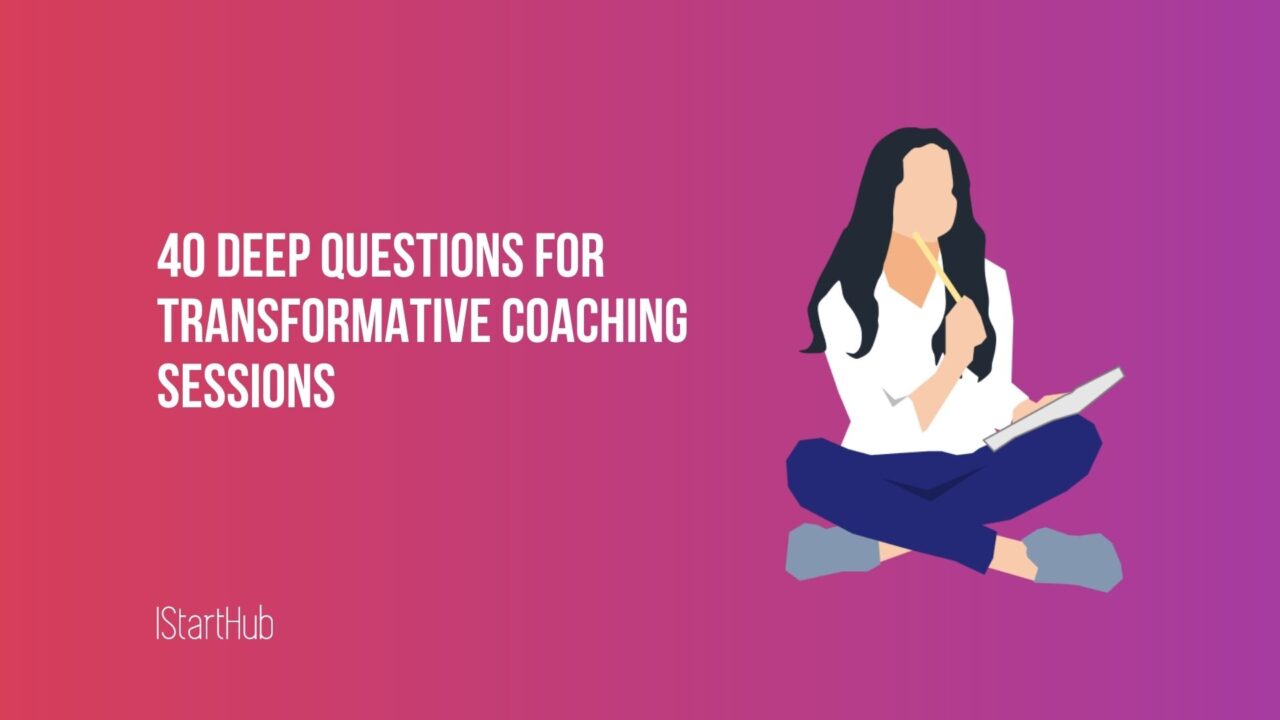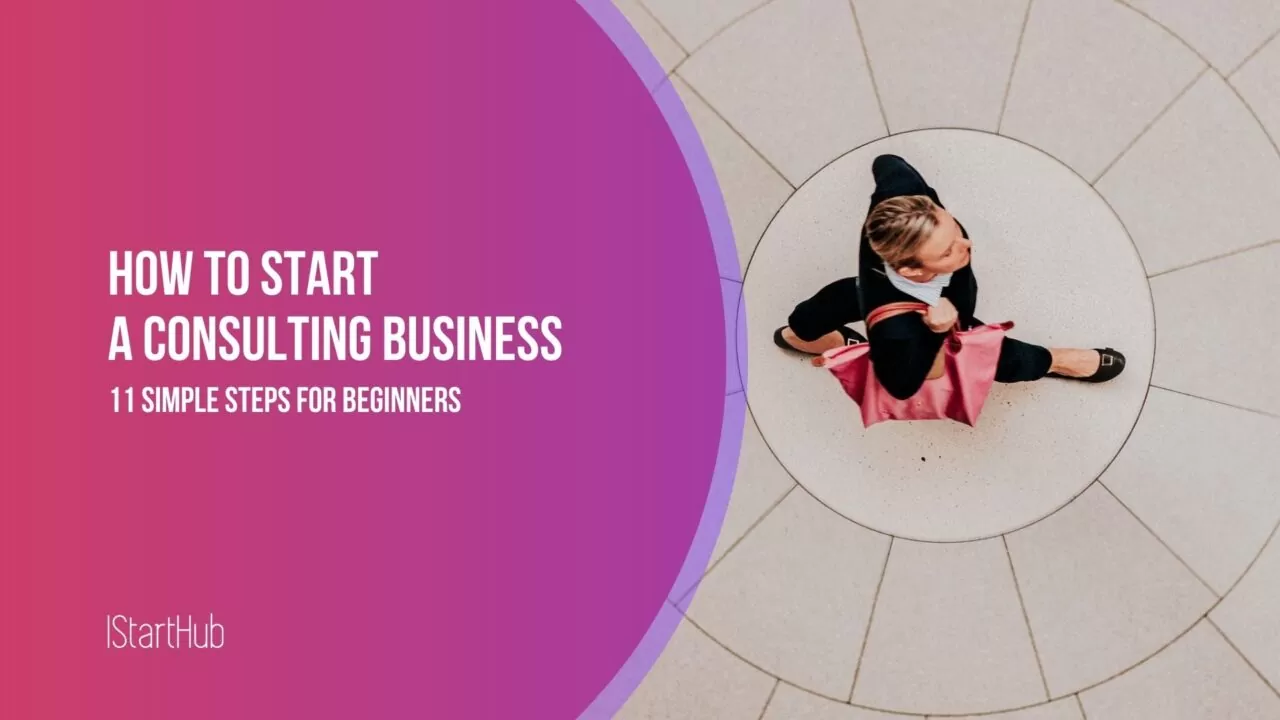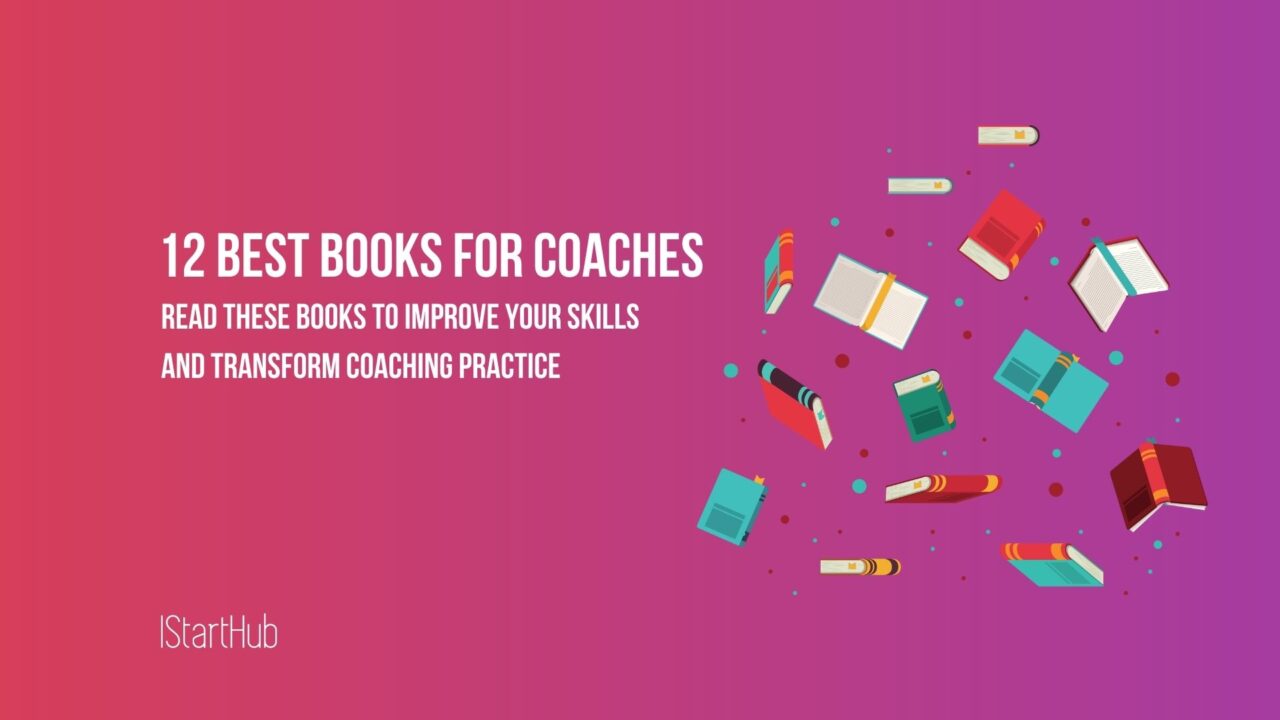Now Reading: 40 Deep Questions For Transformative Coaching Sessions
- 01
40 Deep Questions For Transformative Coaching Sessions
40 Deep Questions For Transformative Coaching Sessions

Effective questioning is the secret sauce to transformative coaching sessions. But let’s be honest, asking clients powerful and impactful deep questions is not a walk in the park.
Many coaches battle with effective communication and lack clarity in formulating questions. Some tend to ask leading questions, thus overwhelming clients with too many inquiries. Others find it difficult to generate appropriate follow-up questions, balance curiosity and structure, and address sensitive or challenging topics.
Overcoming these challenges is essential if you want to build a successful coaching business, create a supportive and exploratory environment and allow your clients to gain deep insights, challenge their assumptions, and unlock their full potential.
But fear not, there’s hope on the horizon. You can conquer these challenges by practicing your questioning skills, actively listening to clients, tailoring questions to individual contexts, and prioritizing clarity. Let’s go through the deep questions that will help you make a difference in your client’s lives.
Why is asking deep questions important in coaching?
Questions catalyze meaningful exploration, self-discovery, and growth. When coaches ask powerful and thought-provoking questions, they create a space for clients to reflect, gain clarity, and tap into their wisdom.
Furthermore, asking questions empowers clients to take ownership of their journey. Instead of providing direct advice or solutions, coaches guide clients through a process of self-discovery and decision-making.
As clients pour out their thoughts and feelings, these questions supercharge their self-awareness, making them accountable and responsible for their actions. They gain a deeper understanding of themselves, make informed choices, and take purposeful steps toward lasting change.
In essence, questioning in coaching nurtures a client-centered approach, where clients become active participants in their transformational process, unlocking their potential and achieving their desired outcomes.
Types of coaching questions
1. Open-ended questions
These questions don’t have a simple “yes” or “no” answer. They invite clients to expand, explore, and dive deep into their thoughts, feelings, and experiences. Examples include: “What possibilities do you see?” or “Tell me more about your goals.”
2. Reflective questions
These questions encourage clients to look inward, ponder, and gain self-awareness. They prompt clients to reflect on their thoughts, emotions, and actions. For instance, you might ask, “How did that make you feel?” or “What have you learned from this experience?”
3. Scaling questions
Here’s where you whip out the metaphorical ruler. Scaling questions help clients assess and evaluate their progress or satisfaction on a scale from 1 to 10. They can be used to gauge commitment, confidence, or readiness for change. For example, try asking, “How motivated are you to attain your goal on a scale of 1 to 10?”
4. Exploratory questions
These questions encourage clients to expand their perspectives into uncharted territories. They challenge assumptions, open new doors, and foster creative thinking. You might ask, “What if you approached this from a completely different angle?” or “What other options have you considered?”
5. Action-oriented questions
If you want to get things moving, action-oriented questions are the way. These questions inspire clients to identify concrete steps and strategies to achieve their goals. They help clients turn their dreams into actionable plans. Examples include: “What specific actions will you take this week?” or “How will you hold yourself accountable?”
6. Clarifying questions
When things get a bit murky, clarifying questions come to the rescue. They help clients articulate their thoughts and provide clarity around their intentions or statements. You could ask, “What specifically do you want to accomplish?”
7. Future-oriented questions
These invite clients to envision their desired future and tap into their aspirations. They help clients set compelling goals and create a vision for their lives. Example: “What would your ideal life look like five years from now?”
8. Probing questions
These go deeper into a particular topic or issue, encouraging clients to explore underlying beliefs, values, and emotions. They promote self-reflection and discovery. Example: “What do you think is holding you back from taking that next step?”
9. Empowering questions
These are designed to inspire and uplift clients, helping them recognize their strengths, capabilities, and potential. They encourage a positive mindset and self-belief. Example of a deep question: “What qualities do you possess that will support you in overcoming this challenge?”
The most powerful deep coaching questions
Life Coaching Questions
1. What is your ultimate vision for your life?
This question helps clients clarify their long-term aspirations and creates a clear direction to work towards, providing motivation and purpose.
2. What core values guide your decisions and actions?
Understanding personal values helps clients make choices that align with their authentic selves, leading to greater fulfillment and satisfaction.
3. What are the biggest obstacles or challenges you’re currently facing?
Identifying obstacles allows clients to develop strategies to overcome them, fostering growth and resilience.
4. What are your best strengths, and how can you leverage them?
Recognizing strengths builds confidence and empowers clients to utilize their unique abilities to achieve their goals.
5. What would you dare to pursue or achieve if fear or self-doubt weren’t holding you back?
This question encourages clients to explore their hidden aspirations and break free from self-imposed limitations, fostering courage and personal growth.
6. What habits or patterns are no longer serving you?
Identifying unhelpful habits allows clients to replace them with more empowering ones, promoting positive change and personal development.
7. What actions can help you improve your work-life balance and overall well-being?
Prioritizing work-life balance and well-being promotes overall happiness and prevents burnout, leading to a more fulfilling and sustainable lifestyle.
8. What does success mean to you personally?
This question encourages clients to define success on their terms, helping them set meaningful goals and evaluate their achievements based on their values and desires.
9. What relationships in your life are most important to you, and how can you nurture and strengthen them?
Recognizing the significance of relationships and investing in their growth fosters connection, support, and overall well-being.
10. What advice would you offer your future self if you could?
This question prompts clients to tap into their wisdom and identify actions they can take now to create a more fulfilling and successful future.
Career Coaching Questions
11. What are your most crucial values, and how do they align with your career goals?
This question helps clients ensure that their career choices are in harmony with their fundamental beliefs, leading to greater job satisfaction and fulfillment.
12. What are your best strengths, and how can you leverage them in your career?
Identifying and utilizing strengths allows clients to excel in their chosen field, increasing their confidence and effectiveness.
13. What are your long-term career aspirations?
This question encourages clients to envision their desired career path, providing direction and motivation to set meaningful goals.
14. What knowledge or skill do you need to develop to advance in your career?
Recognizing areas for growth helps clients plan for professional development, enhancing their marketability and career progression.
15. How can you find work that aligns with your passions and interests?
Exploring interests ensures clients pursue personally fulfilling careers, leading to greater job satisfaction and engagement.
16. What strategies can you employ to overcome career challenges or setbacks?
This question helps clients develop resilience and problem-solving skills, enabling them to navigate obstacles effectively.
17. How can you establish a healthy work-life balance to promote overall well-being?
Prioritizing work-life balance supports clients in maintaining their physical and mental health, leading to greater job satisfaction and overall happiness.
18. What networking opportunities can you pursue to expand your professional connections?
Building a solid professional network opens new opportunities and helps clients stay connected within their industry.
19. How can you effectively showcase your achievements and skills during the job search or promotion process?
This question guides clients in highlighting their strengths and accomplishments, increasing their chances of securing desired career advancements.
20. What things can you do to grow and stay relevant in your industry continually?
Emphasizing continuous learning and professional growth ensures that clients remain competitive and adaptable in a rapidly evolving job market.
Mindset Coaching Questions
21. What beliefs or thoughts are currently holding you back from achieving your goals?
This question helps clients identify limiting beliefs and negative thought patterns that may hinder their progress, allowing them to challenge and replace them with empowering ones.
22. How can you reframe challenges or setbacks as opportunities for growth and learning?
This question encourages clients to adopt a growth mindset, viewing obstacles as stepping stones toward personal and professional development.
23. What self-talk or affirmations can you use to cultivate a positive mindset and boost your confidence?
Recognizing the power of self-talk enables clients to shift their internal dialogue towards self-encouragement, fostering resilience and self-belief.
24. How can you embrace failure as a necessary part of the learning process and become more resilient in the face of setbacks?
Embracing failure as a learning opportunity helps clients overcome their fear of failure, bounce back stronger, and persevere toward their goals.
25. How can you change your outlook so that you concentrate on being grateful and appreciative of the present moment?
Practicing gratitude cultivates a positive mindset, enhances well-being, and fosters resilience during challenging times.
26. What actions can you take to adopt a growth mindset and embrace continuous learning and improvement?
Nurturing a growth mindset encourages clients to see challenges as growth opportunities and seek out new knowledge and skills.
27. How can you reframe obstacles or roadblocks as stepping stones toward success?
This question encourages clients to view challenges as opportunities for personal and professional growth, fostering resilience and determination.
28. What strategies can you implement to overcome self-doubt and cultivate self-confidence?
Addressing self-doubt enables clients to develop a stronger belief in their abilities, empowering them to take bold actions and pursue their goals.
29. How can you approach your personal and professional development in a way that moves you from a fixed mindset toward a growth one?
This question prompts clients to recognize the importance of continuous growth and learning, leading to greater adaptability and success.
30. How can you embrace positive self-talk and self-compassion to cultivate a kinder and more nurturing relationship with yourself?
Developing self-compassion enables clients to cultivate a positive self-image, increase self-acceptance, and foster a resilient mindset.
First Coaching Session Questions
31. What brings you to coaching at this particular moment in your life?
This question allows clients to express their motivations and intentions for seeking coaching, providing insights into their current needs and aspirations.
32. What specific goals or outcomes would you like to achieve through coaching?
Clarifying goals helps the coach and client align their focus and set a clear direction for the coaching journey.
33. What challenges or obstacles are you currently facing that you would like support with?
Identifying challenges helps clients pinpoint areas where they may feel stuck or need guidance, creating a starting point for exploration and growth.
34. What strengths and resources do you possess that can support you in overcoming these challenges?
Recognizing personal strengths empowers clients to leverage their existing capabilities and tap into their inner resources, promoting self-efficacy.
35. How do you envision your ideal future or desired outcomes?
This question invites clients to imagine their desired state, encouraging them to dream big and create a vision for their professional and personal lives
36. How do you typically approach change or navigate transitions in your life?
Understanding a client’s relationship with change provides valuable insights into their adaptability, resilience, and potential areas for growth.
37. What support systems or networks do you have in place?
Exploring existing support systems helps clients recognize available resources and potential avenues for additional support, fostering a sense of connection and accountability.
38. How would you prefer to receive feedback and support?
This question allows clients to express their preferred coaching style and communication preferences, ensuring that the coaching process is tailored to their needs and preferences.
39. What previous experiences or successes can you draw upon as evidence of your capabilities?
Reflecting on past achievements builds confidence and reminds clients of their ability to overcome challenges, fostering a positive mindset and self-belief.
40. How invested are you in taking action and making changes in your life?
Assessing commitment helps clients evaluate their readiness for change and signals their willingness to actively participate in the coaching process.
FAQs
What does make a good coaching question?
A deep coaching question is open-ended, thought-provoking, and tailored to the client’s unique situation. It encourages deep self-reflection, expands awareness, and invites exploration of possibilities. It is non-judgmental but rather empowers the client to find their answers and solutions.
As a coach, you want your questions to spark curiosity, promote self-discovery, and ignite the client’s motivation and commitment to personal growth. Ultimately, a good coaching question facilitates meaningful insights and shifts in thinking, leading to transformative change and desired outcomes for the client.
How can I learn to ask good coaching questions?
Practice. Start by developing your active listening abilities and giving your clients your entire attention. Learn to pose open-ended questions that encourage thought, investigation, and innovation. To ask impactful questions at the right moment, develop your intuition and believe in your gut. Seek feedback and learn from experienced coaches. Continuously expand your knowledge and understanding of coaching methodologies and techniques. With time and dedication, you’ll refine your ability to ask powerful coaching questions that inspire profound insights and transformation in your clients.
Sum Up
The art of asking powerful and deep coaching questions is a transformative skill that can profoundly impact the coaching process. Whether in career, life, or mindset coaching, well-crafted questions facilitate self-reflection, goal clarity, and personal growth. They empower clients to challenge limiting beliefs, explore possibilities, and take meaningful action.
By improving your ability to ask open-ended, thought-provoking questions, you create a supportive space for your clients to gain insights, tap into their potential, and create positive change in their lives. So, embrace the art of asking powerful coaching questions and witness its remarkable impact on the coaching journey.
Tetiana is a business coach and owner of IStartHub, a business media for ambitious female entrepreneurs and small business owners.
















